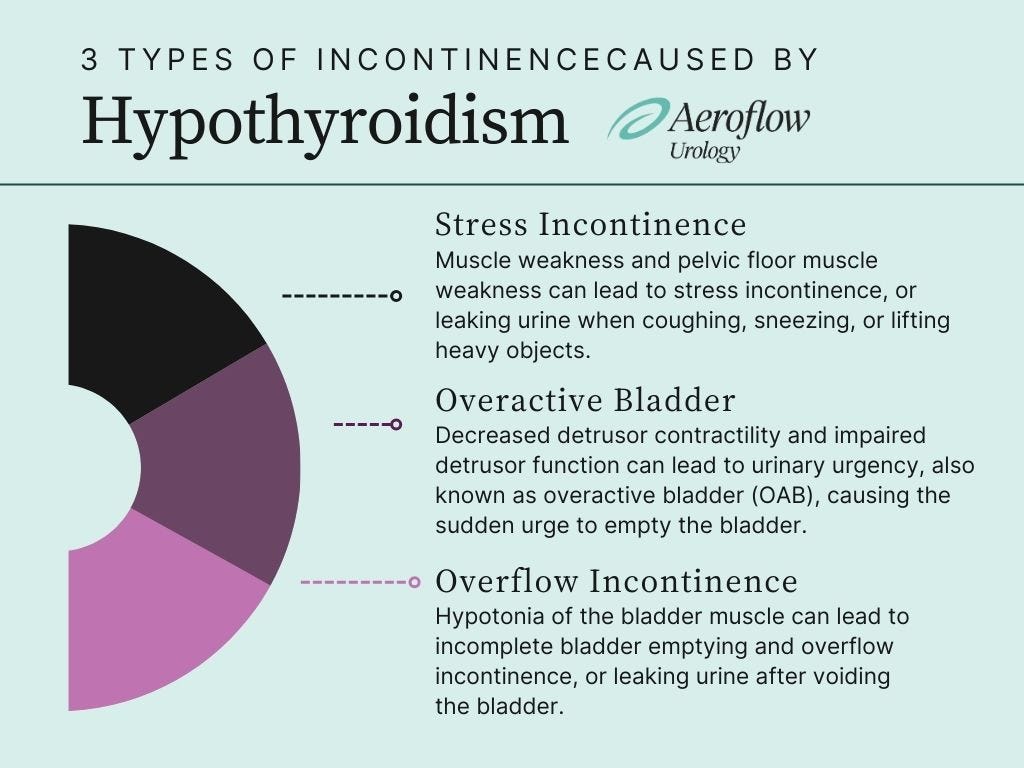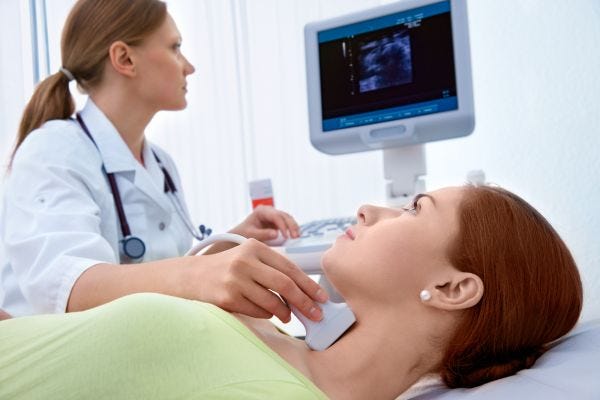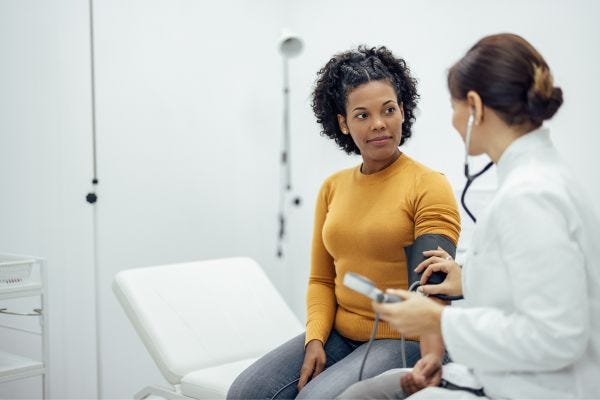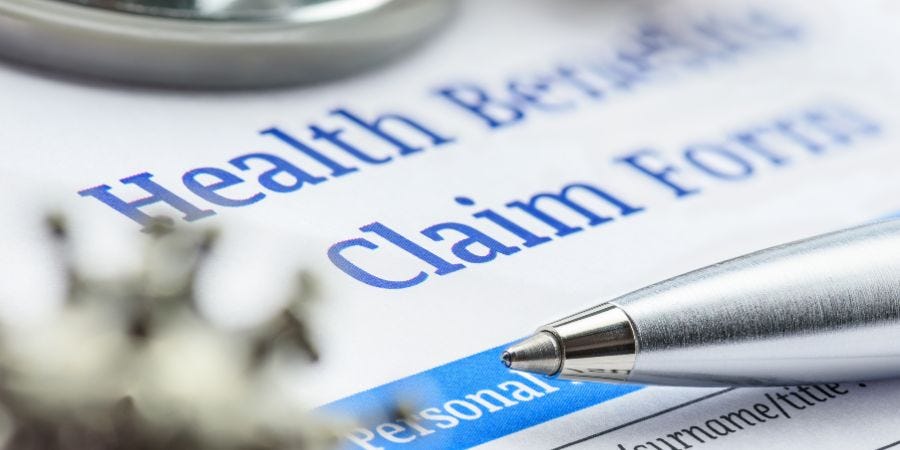Key Takeaways:
- The thyroid gland regulates metabolism, temperature, and heart function through hormones T4 and T3.
- Hypothyroidism leads to insufficient hormone production, causing symptoms like fatigue, weight gain, and urinary issues.
- Treatment and lifestyle changes can manage hypothyroidism and improve related symptoms, including urinary incontinence.


The thyroid gland plays a vital role in maintaining body health by producing hormones that regulate metabolism, temperature, and heart function.
However, when the thyroid becomes under-active, a condition known as hypothyroidism can develop, leading to a range of symptoms, from fatigue and weight gain to urinary issues.
Understanding thyroid functions and hypothyroidism's effects and learning effective management strategies can help you lead a healthier, more comfortable life.
How Does Hypothyroidism Affect the Urinary System?
Types of Urinary Incontinence Associated With Hypothyroidism
Testing & Diagnosis for Hypothyroidism
6 Treatments for Hypothyroidism & Urinary Incontinence
INCONTINENCE PRODUCTS THROUGH INSURANCE:
Aeroflow Urology is in-network with many Medicaid and Medicaid-managed insurance plans and is accredited by Medicaid. Complete our Eligibility Form, and we’ll automatically check to see if your plan covers incontinence supplies. ***Must meet certain requirements to qualify.***
You will also receive the care and attention every person managing incontinence deserves: A personalized list of 100% insurance-covered incontinence supplies, a dedicated Continence Care Specialist you can contact during business hours, a user-friendly online portal for easy monthly reordering, and educational content.
Get the continence care you need with the dignity you deserve. Join the Aeroflow Urology family today! It only takes 5 minutes to get started.
Check Your Eligibility
In Under 2 Minutes
Discover the adult incontinence products available through your insurance.
What Is the Thyroid Gland?
The general function of the thyroid gland is to produce, store, and release hormones to regulate your body's metabolism. The 2 main hormones your thyroid controls are thyroxine (T4) and triiodothyronine (T3). These hormones:
- Control your metabolic rate and how your body converts food into energy.
- Are critical for normal growth and development, especially in children, for bones and muscles.
- Control temperature regulation.
- Assist in cardiac function (normal heart function and regulate blood pressure).
- Assist in protein synthesis for growth and repair of tissues.
- Regulate lipids and carbohydrates, which affect cholesterol levels, especially regarding insulin sensitivity.
What Causes Hypothyroidism?
Hypothyroidism is a type of thyroid dysfunction that occurs when the thyroid is under-active, creating insufficient levels of thyroid hormones. Symptoms of hypothyroidism and improper thyroid function include fatigue, weight gain, cold intolerance, and even mood changes, such as depression.
How Does Hypothyroidism Affect the Urinary System?
In a 2021 study of 7,699 women, no association was found between hypothyroidism and urinary incontinence after controlling for other factors. The study found that 43.6% of women with hypothyroidism had urinary incontinence, compared to 39.3% of women with normal thyroid hormone levels. However, many participants experienced urinary incontinence regardless of their thyroid status.
Another study found that people with hypothyroidism may experience symptoms like urinary frequency, urgency, and incontinence, which could increase the risk of developing a urinary tract infection (UTI).
Overall, we still need more research on the correlation between hypothyroidism and urinary incontinence. However, it has been shown that hypothyroidism can lead to changes in the urinary system, leading to:
- Decreased glomerular filtration rate (GFR), leading to kidney failure and reduced clearance of waste products from the blood.
- Water retention, leading to edema.
- Electrolyte imbalances, including hyponatremia.
- Decreased bladder contractility, leading to incomplete bladder emptying and risk of urinary tract infections (UTIs).
- Polyuria, when the body makes more urine than normal.
- Decreased ability to concentrate urine, which can lead to dilute urine output and dehydration.


Types of Urinary Incontinence Associated With Hypothyroidism
Hypothyroidism can lead to a few different types of urinary incontinence. These include:
Stress Incontinence
Hypothyroidism can cause muscle weakness, including the pelvic floor muscles. It can also cause increased weight gain, leading to increased abdominal adiposity and increased abdominal pressure on the pelvic floor muscles and bladder.
The main symptom of stress incontinence is leaking urine when laughing, coughing, sneezing, lifting heavy objects, or exercising.
Urge Incontinence / Overactive Bladder (OAB)
Hypothyroidism can lead to decreased detrusor contractility and impaired detrusor function, as well as peripheral neuropathy or other pelvic nerve dysfunction. This can cause urinary urgency, also known as OAB.
The main symptom of OAB is feeling the sudden and intense urge to void the bladder, resulting in leakage.
Overflow Incontinence
Hypothyroidism can cause hypotonia of the detrusor muscle, leading to incomplete bladder emptying and overflow incontinence. It can also cause constipation, leading to increased pelvic pressure and decreased nerve sensation, which can lead to neurogenic bladder and incomplete bladder emptying.
The main symptom of overflow incontinence is dribbling or leaking urine after voiding your bladder due to incomplete bladder emptying.
The longer hypothyroid disease is undetected, or if your condition becomes very severe, the chance that your renal and bladder function will be affected increases.
Testing & Diagnosis for Hypothyroidism
If you expect that you're experiencing thyroid problems and urinary incontinence, you should speak with your healthcare provider. If you have no other risk factors for urinary incontinence, hypothyroidism could be the reason you're experiencing incontinence symptoms.
Your healthcare provider may be able to conduct tests to diagnose and treat your conditions. Recommended tests include:
- Lab serum testing on thyroid panel levels and renal function.
- Urinalysis
- Post void residual.
- Urodynamics testing.


6 Treatments for Hypothyroidism & Urinary Incontinence
- Find the cause of your incontinence symptoms. Speaking to your healthcare provider and focusing on the cause of your incontinence symptoms is the essential first step in managing your condition, which could be correlated to your thyroid. After you determine if you have hypothyroidism, you can focus on treating both conditions.
- Thyroid hormone replacement therapy. As long as hormone replacement treatment interventions are implemented early with thyroid disease, urinary symptoms should improve relatively quickly. The longer you wait to treat or correct / balance your thyroid, the worse your bladder function issues could be, and the more difficult it can be to correct the influences of the thyroid on the pelvis and bladder.
- Decrease cortisol spikes. To decrease cortisol spikes with hypothyroidism, focus on increasing your sleep, reducing stress, and decreasing caffeine intake.
- Improve urinary symptoms. To improve your urinary symptoms caused by hypothyroidism, stay hydrated, avoid constipation by eating a diet full of whole-grain fibers and whole foods, and decrease bladder irritants, such as spicy foods, tomato-based products, alcohol, and caffeine.
- Manage your weight. Decreasing central adiposity to avoid extra abdominal pressure can help with urinary incontinence. However, this can be difficult as hypothyroidism slows down metabolism, and decreasing weight in that area can be difficult. Diet can help avoid constipation, optimize metabolism, and avoid bladder irritants to limit extra pressure on the bladder.
- Medications. Speak with your healthcare provider about which medications you can take to improve symptoms of urinary incontinence and control your hypothyroidism.
- Bladder control products. Use protective and discreet bladder control products to manage your leakage and other symptoms of urinary incontinence. These products are suitable for men and women, and they may be free through your insurance with Aeroflow Urology!
It can take several months to see your thyroid levels normalize and urinary symptoms to improve, but don't give up! Urinary incontinence is often reversible and manageable. Keep track of your symptoms and improvements once treatments have been initiated. Continue to talk to your healthcare provider if your symptoms are not improving or worsening.
Disclaimer
Information provided on the Aeroflow Urology blog is not intended as a substitute for medical advice or care from a healthcare professional. Aeroflow recommends consulting your healthcare provider if you are experiencing medical issues relating to incontinence.













